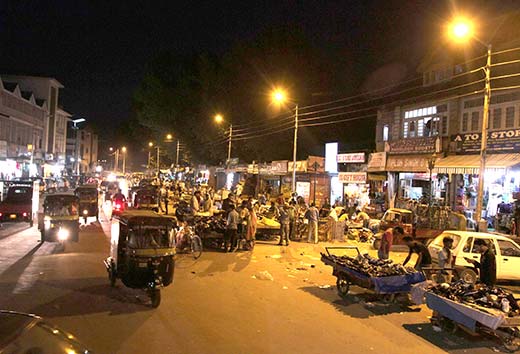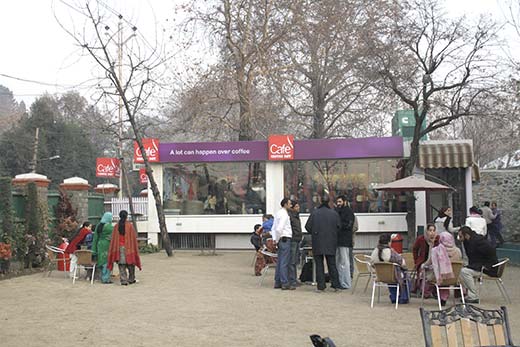With BJP in New Delhi the debate on Article 370 is back in focus. The argument this time is that it hampers development work in Kashmir. Is development just a ploy to fiddle with J&K’s special status? Qazi Zaid finds out

Pic: Bilal Bahadur
There is a law that disallows non-state subjects from owning land in the state of J&K but it is not article 370. It is the ‘Transfer of Property Act’ in the state’s constitution that ensures that land can only be owned by ‘subjects of the state’. This has been confused with the article 370.
The law that defined a state subject was brought into practice by the Maharaja in 1927, after the lobbying from the Kashmiri Pandits and the Dogra Sabha in Jammu. “The Pandits feared that their employment opportunities in the government were being threatened by the Punjabis, who came to Jammu during the Sikh rule” says Syed Noorul Hassan, a Kashmir based historian. Kashmir under Maharaja rule had witnessed a system of Brahmin supremacy, where most jobs were given to pundits, while Muslims were systematically kept uneducated and out of positions of power.
The Transfer of Property Act, which necessitates that land can only be transferred to a state subject, was included in the constitution of Jammu and Kashmir to protect the state from migrant takeover and is separate from article 370. “Article 370 only defines the constitutional relationship of the state of J&K with New Delhi. It does not prohibit non state subjects from owning land in J&K”, says Ambreen Rasool, a lawyer practicing in the Supreme court of India. The law defines areas where the center can make laws for the state. Initially it was confined to defense, foreign affairs, currency and communication. Today, with the concurrence of the state assembly, the center can directly legislate on almost everything that is important.
Article 370 was drafted into the Indian constitution by N. Gopaaswami Ayyangar and was the constitutional form of the instrument of accession. But J&K is not the only state to enjoy such provisions. Similar laws like article 370 exist in Maharashtra, Nagaland, Assam and the ‘famous for development’ Gujarat where article 371A provides special provisions.
So the argument would move forward and a logical point would be to analyze if not the controversial 370, does the State Subject and the Transfer of property Act hamper the development of the state. The answer is no. The act that defines who a state subject is, does not place companies and organizations as state subjects. Currently the State Government, instead of selling land to companies owned by non state subjects, follows the procedure of leasing it out to them. A standard rule of leasing the land for 99 years is almost always followed.
State Industrial Development Corporation (SIDCO) has leased out land to over 100 companies in the state. The list includes companies like Hindustan Unilever, Cadila, Sun Pharma, Jaypee Group and Jindal Group to name a few. Many of these companies have been leased the land for 99 years, for industrial use. Neither article 370, nor the transfer of property act plays a role here. “Companies and industries owned by non-state subjects cannot permanently own land in the name of the company, the government leases it out to them. The process for leasing the land by companies, owned by non state subjects and state subjects, is more or less the same,” says Aga Syed Aijaz Hussain, General Manager of SIDCO.
In addition to this, the state of J&K gives huge benefits to corporation to set up industries in the state. The benefits include exemption of income and sales tax for five years and excise reliefs. These steps taken to boost industrial infrastructure, that has taken a blow due to political uncertainty in the region, have attracted many big guns from India as well as abroad.
In a region that had been significantly cut off from the outside world for a large part of history, cellular technology came much later, as compared to mainland India. Indian Telecom giant Bharti Airtel, was the first private sector mobile service to launch operations in J&K. According to Airtel’s official website, Rs 125 Cr was the investment, programmed to be made, while providing direct and indirect employment to 1200 people. The website gives the figure of 2005, the current figure is much higher. After Airtel tested the waters in the volatile state and were successful, private Indian companies like Aircel, Reliance and Idea did not let them have a field day for much longer. Vodafone is another Telecom giant that operates in J&K. Had article 370 played a spoiler, such a scenario would have been impossible.
In the Automobile sector, companies like Hyundai, TATA motors and Maruti-Suzuki have huge showrooms and outlets in many different parts of the state, which are tie-ups with locals. In order to reach out to the customers in the interior of rural areas, many of these outlets have opened e-outlets for expansion of sales. Maruti-Suzuki recently entered into an agreement with J&K Bank, where the latter agreed to finance the former’s customers. Article 370 or the ‘transfer of property act’ have not stopped foreign companies like Volkswagen to function in the state.

Pic: Bilal Bahadur
In the banking sector, J&K bank was the major player till very recently and could boast majority of the share of the market. J&K bank, which is a private bank, is the only private sector bank designated as Reserve Bank of India’s agent for banking business and carries out the banking business of the Central Government. HDFC bank, which is a multinational bank, opened its branches in the state of J&K in the last decade. “The bank does not own the property where it has a branch or an ATM, it belongs to a local and we rent the place. This is how we function outside the state of J&K and this is how we function here as well,” says a senior official at HDFC bank who does not wish to be named. This model of development has in fact assured, that with the corporate, locals get an equal opportunity to grow, at the same time creating employment in the state. With the new model of development being pushed by the ruling party in India, which gives corporates a free hand, this model may be seen a stumbling block. In a bold decision, the previous Congress led United Progressive Alliance (UPA) government had allowed 100% foreign Direct investment (FDI) in Defense and Telecom sectors. In a bid to send a strong signal to the investors, the Narendra Modi government began work on this, within two days of taking charge.
In the vicinity of the Zabarwan mountain range, overlooking the famous Dal Lake, Taj Vivanta hotel, a part of The Indian Hotels Company Limited (IHCL), gave luxury tourism a much needed break in Kashmir. Land is owned by a local corporate Saifco while Taj provides the brand name and maintains standards. Tourism industry in the state has grown, despite article 370, as the state can make laws which are best suitable for its economic and environmental needs. If there is any law that is stopping the growth of tourism industry in Jammu and Kashmir, it is the law that requires a ‘sovereign guarantee’ from the central government, before foreign companies can help build infrastructure for tourism. A sovereign guarantee is a guarantee by government that all obligations will be satisfied when and if, the primary obligor goes into default. The Union ministry of Finance extended sovereign guarantee to Air India to raise cheaper funds from banks. This was done twice in the year 2013.
While policies were being made and steps being taken in 2008-09, to keep the youth away from stone pelting and venting out their anger on the social media, which included shutting down of the internet services for a period of time, coffee shops were hardly on anyone’s mind. Café Coffee Day (CCD), a division of the Amalgamated Bean Coffee Trading Company Limited, is a recent Indian corporation that came to Srinagar, Kashmir. CCD follows the same model. Iqbal Tramboo who owns the hotel where CCD has an outlet, says, “We have lost the famous eating places which had to close down due to loss of business during the conflict. We wanted CCD to come here so the youth have a place to relax. I provided the area and invited CCD to operate. It was difficult at first, not because of un-availability of a place but because they were worried about their investment. They started with one outlet, now there are several, including one in Kashmir University.” According to Iqbal, this experiment opened a new door of business opportunities and played a role in the lucrative business of coffee shops. Soon after Iqbal’s initiation, many new retro Coffee shops, owned by young entrepreneurs, opened up in Srinagar which matched the standards that CCD is maintaining.
Jammu region has seen a greater surge than Kashmir, in the setup of foreign and Indian Pharmaceutical companies. Sameer Qanungo, Manager of Pharma Agency, a company of distributors of pharmaceuticals in Kashmir, says, “Consumption of pharmaceuticals is much higher in Kashmir Division than Jammu. The companies and their manufacturing units are situated in Jammu where land has been leased out to them. This may sound like bad business but it is not. The reason for that is better connectivity of the Jammu plains, lower transportation costs and better availability of labour throughout the year.” This dis-balance may change with the completion of the railway project, which seeks to connect Kashmir to Jammu via rail.
The argument that is doing rounds currently states that Article 370 was temporary provision. This may be a part of truth since the article was a constitutional form of the document of accession, and the accession to India itself was temporary. Lord Mountbatten, the then Governor General of India accepted the signed accession document with a note which said, “It is my government’s wish that as soon as law and order have been restored in Jammu and Kashmir and her soil cleared of the invader, the question of the State’s accession should be settled by a reference to the people.”
Article 370 hasn’t stopped investments from pouring in to Jammu where political environment is better suited for trade and connectivity and transportation costs do not affect business. The reasons are purely economic and not legal. In a region where political environment dictates economics, the need of the hour is to strengthen economic sustainability and self-sufficiency of the state, through better connectivity and infra-structure. Disturbing the law and order though empty rhetoric to score political points may reap dividends during the elections, but it may turn out to be political short-sightedness, with respect to achieving a lasting political solution in the region.















